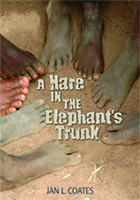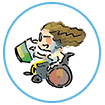 Summary: Caught in a war between North and South Sudan, seven year-old Jacob Akech is driven from his home and separated from the rest of his family. Jacob, his nephew Monyroor, and his friend Oscar join thousands of other boys in the same predicament. Known as “The Lost Boys” to the world at large, they make their way to a refugee camp in Ethiopia and then to one in Kenya when the first is dismantled. Jacob grows up on his feet, finding family in the boys he travels with and surviving dehydration, starvation, and animal attacks. Caught between being encouraged to become a soldier and his mother’s wish that he should be educated, Jacob must figure out for himself which option is in the best interest of Sudan.
Summary: Caught in a war between North and South Sudan, seven year-old Jacob Akech is driven from his home and separated from the rest of his family. Jacob, his nephew Monyroor, and his friend Oscar join thousands of other boys in the same predicament. Known as “The Lost Boys” to the world at large, they make their way to a refugee camp in Ethiopia and then to one in Kenya when the first is dismantled. Jacob grows up on his feet, finding family in the boys he travels with and surviving dehydration, starvation, and animal attacks. Caught between being encouraged to become a soldier and his mother’s wish that he should be educated, Jacob must figure out for himself which option is in the best interest of Sudan.
Number of Pages: 274
Age Range: 12-14
Review: Loosely based on the real life story of Jacob Deng, A Hare in the Elephant’s Trunk by Jan L. Coates follows Jacob Akech and the journey of the Lost Boys displaced from their homes by the war in Sudan. This book is important from a historical perspective, and I have to admit I didn’t know anything about the Lost Boys until I read it.
Coates uses Jacob’s story to show the conflict of a nation at war, and I liked how she set up Jacob’s personal struggle between strength and intellect. Will the war be solved with more soldiers and might? Or does it take education to change the attitudes of those who would become soldiers? It’s a complicated question that Coates attempts to answer.
Although Jacob’s character starts out being seven years-old, I would recommend this book for early teen readers because it contains some serious themes and complex ideas. As a historical piece, I think it is also suitable for adults and classroom reading. My interest on the subject has been piqued by Coates’ book and I would love to do some non-fiction reading about the Lost Boys now as well. If you would like more information about the real Jacob and his foundation, Wadeng Wings of Hope, that focuses on fostering literacy in South Sudan, visit www.wadeng.org.
Memorable Quotes:
“‘We must keep looking ahead,’ Monyroor said. ‘The past is over, it cannot be changed. But we can change the future, make sure the past is not repeated. In school, we can learn ways to make Sudan stronger when we return.'” – Monyroor from A Hare in the Elephant’s Trunk by Jan L. Coates, page 124
“‘But maybe the King of the Beast should be the smartest animal, not the strongest. most powerful one,’ Jacob said. “Maybe Hare is actually the King of the Beasts.'” – Jacob from A Hare in the Elephant’s Trunk by Jan L. Coates, page 129
“‘That is a strong sweater,’ The farmer admired its thick, heavy cotton. ‘It would keep my son warm during the cool winter evenings.’ He held up a red t-shirt. ‘And what do these words say?’
‘Just Do It!’ Jacob read, translating the words into Dinka.
‘Do what?’ the farmer asked.
Jacob shrugged. ‘Whatever you must do, I suppose.'” – conversation between the farmer and Jacob from A Hare in the Elephant’s Trunk by Jan L. Coates, page 235
A Hare in the Elephant’s Trunk by Jan L. Coates is published by Red Deer Press (2010).
(Buy this book: Amazon | Indigo | Canadian Booksellers)




 Amy Mathers has been passionate about reading from a very young age, and hopes others will share her enthusiasm for funding a teen book award.
Amy Mathers has been passionate about reading from a very young age, and hopes others will share her enthusiasm for funding a teen book award. 





